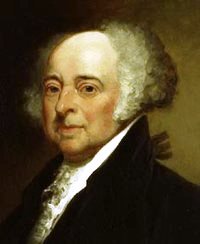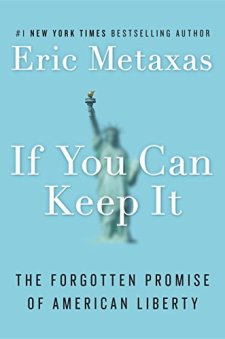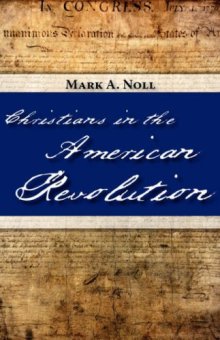[I’m taking a break for a couple of weeks, and, given the impending Fourth of July holiday, I’ve been re-posting some of my favorite past essays on the American founding. The question of whether the Founding Fathers were Christian is both important and controversial. The essay below is an extended review of one of the most careful and persuasive responses to that question, Gregg L. Frazer’s The Religious Beliefs of America’s Founders.]
____________________

A portion of “Declaration of Independence,” by John Trumbull, 1818
For Christians interested in American history, probably no question looms larger than this one: Were the men who brought our nation into existence authentically Christian?
This is not inevitable. There are a host of other questions that we could imagine rising to the top: Have America’s wars always been just? Was the defense of the Union scripturally justifiable? What should we think of American territorial expansion? Have we shown mercy to the strangers among us? How has America been influenced by the marketplace? What has been our record in dealing with the widow and the orphan? How should we rate our influence on the world?
All of these should demand our attention if we’re really interested in thinking Christianly about our national heritage. None of them captivates us like the question of the religion of the Founders. It isn’t hard to see why. Over time we’ve come to impute enormous political significance to the question. The question of whether the Founding Fathers were Christian frames the story that we tell about our beginning as a nation. It becomes central to how we define our identity, not only with regard to our past—who were we?—but also with regard to our present and our future—who are we supposed to be? And so the debate over the religious convictions of a handful of eighteenth-century statesmen is now inextricably intertwined with contemporary debates over the place of religion in the public square. The past becomes proxy for the present.
Predictably, the political stakes make the question almost impossible to approach objectively. Polemics abound. Historians—not to mention armies of politicians, pundits, and preachers—have spilled oceans of ink in addressing the question. But despite some notable exceptions, the debate on the whole has generated way more heat and hyperbole than light and nuance. As is so often the case, the extremes command the most attention. Want to attract a large following? Be dogmatic and simplistic. Nearly two centuries ago Alexis de Tocqueville laid out the winning formula in Democracy in America: “A false but clear and precise idea always has more power in the world than one which is true but complex,” Tocqueville observed. He was dead on.
The result is a stark dichotomy: One side insists that the Founders were born-again believers, men of Christian faith guided by Christian principles to establish a Christian nation. The other side contends that they were apostles of the Enlightenment, radical skeptics determined to purge public life of every whiff of religious superstition and “bigotry.” You can take your pick, in other words, between the Founding Fathers as forerunners of the Moral Majority or as ancestors of the ACLU.
Given the explosiveness of the topic, the safest course is simply to steer clear of it. Barring that, the next smoothest path is to preach to the choir—pick a side and beat the drum for it. Those on the other side will mostly ignore you, while those who agree with you will welcome the affirmation. Few of us relish having our prejudices challenged; not many of us mind having our prejudices confirmed.
Historian Gregg Frazer has not chosen the broad and gentle path. Instead, he has written a book that will offend almost everyone invested in the debate, save a handful of scholars. I recently read his 2012 book, The Religious Beliefs of America’s Founders: Reason, Revelation, and Revolution. The author, professor of History and Political Studies at the Master’s College in Santa Clarita, California, wants nothing to do with either extreme. On the book’s very first page he throws down the gauntlet: “I want to force extremists on the Left and on the Right to make the case for their vision of what America should be on its own merits,” Fraser writes, “without hijacking the fame of the Founders and without holding their reputations hostage to causes of which they would not approve.” It’s a courageous objective, and he’s written a worthwhile book. I commend it to any thinking Christian interested in the American past.

In a sense, The Religious Beliefs of America’s Founders is really two books for the price of one. First, Fraser scrupulously scrutinizes the religious beliefs of eight key founders: George Washington, John Adams, Thomas Jefferson, Benjamin Franklin, James Madison, Alexander Hamilton, Gouverneur Morris, and James Wilson. (The latter two often don’t make the cut for these kinds of studies, but Frazer includes them because of the significant, if often forgotten roles that they played at the Philadelphia Constitutional Convention.) Second, in an investigation that anticipates James Byrd’s book Sacred Scripture, Sacred War, he offers a careful assessment of the revolutionary era pulpit and the arguments that colonial ministers made in support of independence. (For my review of Byrd’s fine book, click here.)
Frazer arrives at two key conclusions. First, concerning the religious beliefs of the Founding Fathers: Frazer determines that the leading Founders were not Christian in any orthodox sense, as the Christian America propagandists would have us believe, but neither were they liberal Deists, as secular academics so often insist. Indeed, no existing category satisfactorily captures the constellation of convictions that Fraser discovered, so he created a new one: theistic rationalism.
There’s a symmetry to the combination of these terms that reflects the two-front war that Frazer is fighting. The noun rationalism underscores that the leading Founders weren’t Christian, as David Barton and others so strenuously insist. (To read my review of Barton’s book The Jefferson Lies, click here.) But the adjective theistic emphasizes that they also weren’t functionally atheist, as Matthew Stewart has dogmatically argued, for example. (Click here to read my review of his book Nature’s God: The Heretical Origins of the American Republic.)
According to Frazer, “Theistic rationalism was a hybrid belief system mixing elements of natural religion, Christianity, and rationalism, with rationalism as the predominant element.” [Rationalism is a philosophy of knowledge that makes human reason the ultimate arbiter of all truth claims.] If we were to imagine a continuum of religious belief, theistic rationalism would fall somewhere between orthodox Christianity (defined by historic confessions such as the Apostles’ or Nicene creeds) and Deism.
The latter is a slippery concept. Deism in the late-eighteenth century was not embodied in a formal denomination. It had no official creed or confession, and I’ve come across a range of definitions of it in my reading. I can’t say that Frazer’s understanding of Deism is the right one, but I do applaud him for offering a precise definition up front. Deism, as Frazer defines it, has two distinguishing characteristics: The first is the belief in an absent God, a Deity who takes no active role in his creation. There is no logical reason to pray to such a God or to expect this watchmaker Creator to intervene in human affairs. The second distinguishing feature, which follows logically from the first, is the rejection of the very possibility of what theologians call “special” (as opposed to “general”) revelation. The God of Deism does not speak to humankind except through the order inherent in the natural world.
The key Founders that Frazer studied rejected both premises. Their correspondence suggests that they believed that parts of the Bible are inspired. They prayed for God’s assistance, they praised God for His deliverance, and they believed in (or hoped for) an afterlife. Whenever scripture and reason conflicted, however, reason trumped revelation. The Founders’ rationalism led them to deny original sin, hell, the virgin birth, the Trinity, the resurrection, and miracles in general.
So what does this mean for contemporary cultural debates over the Founders’ religious beliefs? To a degree that would make the ACLU shudder, the Founders agreed that “the morality engendered by religion was indispensable to society.” But they simultaneously believed that “many—perhaps all—religious traditions or systems were valid and led to the same God.” They were NOT Christian—Frazer emphasizes this repeatedly—and it is a libel on Christianity when David Barton and others insist that they were.
Frazer stresses that theistic rationalism was primarily limited to intellectual elites and “never became the property of the masses” during the era of the American Revolution. It did find considerable voice among colonial pastors, however, and was widely trumpeted from the Revolutionary pulpit. While “Christian America” proponents exult in the degree to which American ministers backed the cause of independence, Frazer finds in that pattern distressing evidence of the Church’s conformity to the world.
In a section on ministers’ biblical exegesis, Frazer reviews published sermons to show that patriot preachers regularly interpreted passages pertaining to spiritual liberty as if they were meant to apply to political liberty. They regularly appealed to reason. They frequently stressed the Lockean construction of the state of nature. They accepted uncritically the Enlightenment understanding of popular sovereignty, despite its implication that God, not the people, is the ultimate source of political authority. Finally, they repeatedly spoke of God-given natural rights, despite the Bible’s conspicuous silence on the topic.
In an argument that will make many readers uncomfortable, Frazer maintains that “the biblical God does not specifically or exclusively favor liberal democratic thought.” As a result, pastors determined to find religious authority for the cause of independence discovered that “the Christian God—the God of the Bible—was inadequate for their political needs,” Frazer writes. “That God did not grant political freedom. He claimed to be the sole source of governmental authority, He neither granted nor recognized natural rights, and He preferred faith and obedience to moralism.”
In embracing liberal democratic theory, according to Frazer, patriotic ministers found much in the Scripture that they had to ignore or explain away. “Theology militated against democratic thought until the mid-1700s,” the author contends, “when the Enlightenment-based education of the clergy began to be exhibited in the expounding of liberal democratic and republican principles from the pulpit.” In sum, the vital role that the clergy played in promoting independence was not a sign of the vitality of American Christianity—as David Barton would have us believe, for example—but rather testimony to the degree to which Christian leaders were conforming to the world. And what of the believers in the pews? “The people,” Frazer concludes, “largely wanted to affirm the theistic rationalists’ political message.”
Frazer is not as careful as I would wish in making these contentions. You can read his book and almost come away with a view of colonial pastors and parishioners as coldly calculating, consciously sorting through the Scripture for politically useful proof texts and ignoring the rest. I would add that he is equally critical of twenty-first-century proponents of either extreme in the current cultural debate. The author contends that the secular interpretation of America’s founding is widely accepted in part “because members of its intended audiences want to believe that it is true.” In like manner, he maintains that “the Christian America view has found a huge and trusting audience among those . . . who want to believe that the view is accurate.”
I would qualify these claims a bit more carefully. I don’t believe that many colonial pastors consciously compromised with religious orthodoxy because it was politically inconvenient, any more than I am persuaded that either side in today’s culture wars is consciously embracing a position that it doubts to be true. I think instances of that are probably pretty rare. The temptation that most of us face is not to dishonesty but to what I would call willful gullibility—the readiness to accept uncritically what we want to be true, whether we’re talking about the teaching of Scripture or the lessons of history. Frazer’s book is a sobering reminder of just how powerful that temptation can be.

















